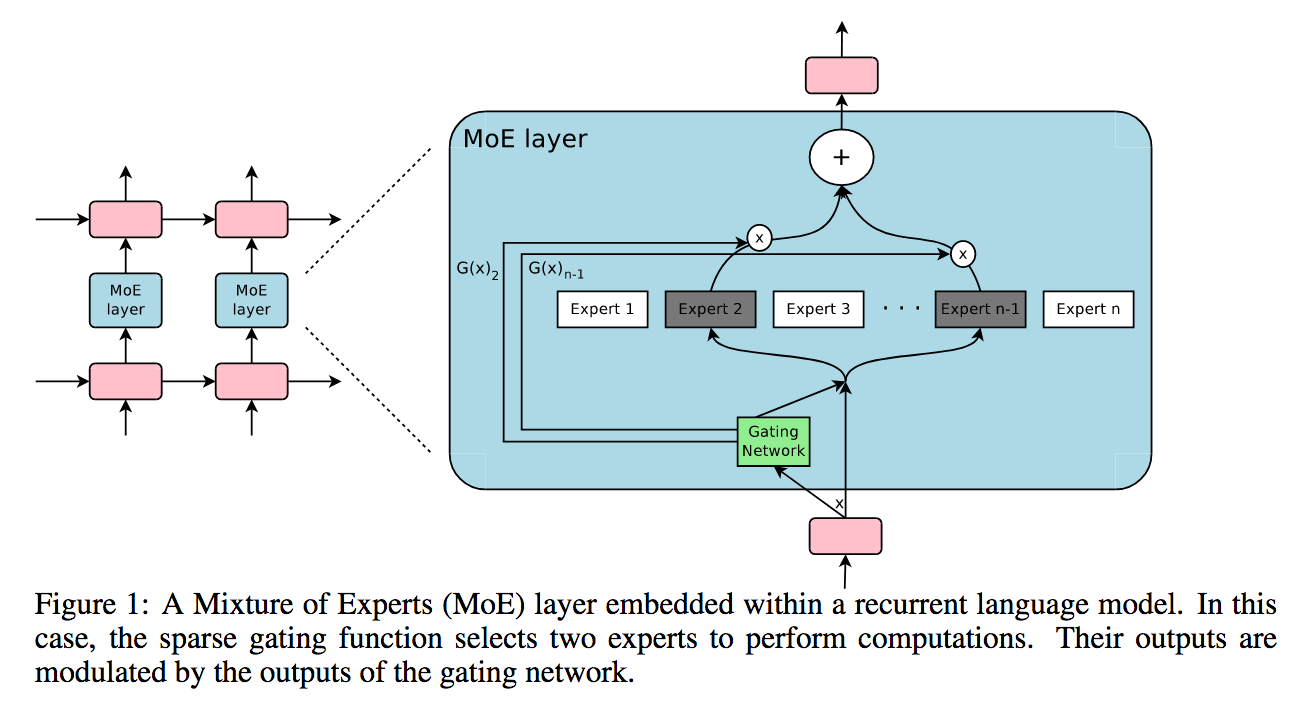A Pytorch implementation of Sparsely Gated Mixture of Experts, for massively increasing the capacity (parameter count) of a language model while keeping the computation constant.
It will mostly be a line-by-line transcription of the tensorflow implementation here, with a few enhancements.
$ pip install mixture_of_expertsimport torch
from torch import nn
from mixture_of_experts import MoE
moe = MoE(
dim = 512,
num_experts = 16, # increase the experts (# parameters) of your model without increasing computation
hidden_dim = 512 * 4, # size of hidden dimension in each expert, defaults to 4 * dimension
activation = nn.LeakyReLU, # use your preferred activation, will default to GELU
second_policy_train = 'random', # in top_2 gating, policy for whether to use a second-place expert
second_policy_eval = 'random', # all (always) | none (never) | threshold (if gate value > the given threshold) | random (if gate value > threshold * random_uniform(0, 1))
second_threshold_train = 0.2,
second_threshold_eval = 0.2,
capacity_factor_train = 1.25, # experts have fixed capacity per batch. we need some extra capacity in case gating is not perfectly balanced.
capacity_factor_eval = 2., # capacity_factor_* should be set to a value >=1
loss_coef = 1e-2 # multiplier on the auxiliary expert balancing auxiliary loss
)
inputs = torch.randn(4, 1024, 512)
out, aux_loss = moe(inputs) # (4, 1024, 512), (1,)The above should suffice for a single machine, but if you want a heirarchical mixture of experts (2 levels), as used in the GShard paper, please follow the instructions below
import torch
from mixture_of_experts import HeirarchicalMoE
moe = HeirarchicalMoE(
dim = 512,
num_experts = (4, 4), # 4 gates on the first layer, then 4 experts on the second, equaling 16 experts
)
inputs = torch.randn(4, 1024, 512)
out, aux_loss = moe(inputs) # (4, 1024, 512), (1,)1 billion parameters
import torch
from mixture_of_experts import HeirarchicalMoE
moe = HeirarchicalMoE(
dim = 512,
num_experts = (22, 22)
).cuda()
inputs = torch.randn(1, 1024, 512).cuda()
out, aux_loss = moe(inputs)
total_params = sum(p.numel() for p in moe.parameters())
print(f'number of parameters - {total_params}')If you want some more sophisticated network for the experts, you can define your own and pass it into the MoE class as experts
import torch
from torch import nn
from mixture_of_experts import MoE
# a 3 layered MLP as the experts
class Experts(nn.Module):
def __init__(self, dim, num_experts = 16):
super().__init__()
self.w1 = nn.Parameter(torch.randn(num_experts, dim, dim * 4))
self.w2 = nn.Parameter(torch.randn(num_experts, dim * 4, dim * 4))
self.w3 = nn.Parameter(torch.randn(num_experts, dim * 4, dim))
self.act = nn.LeakyReLU(inplace = True)
def forward(self, x):
hidden1 = self.act(torch.einsum('end,edh->enh', x, self.w1))
hidden2 = self.act(torch.einsum('end,edh->enh', hidden1, self.w2))
out = torch.einsum('end,edh->enh', hidden2, self.w3)
return out
experts = Experts(512, num_experts = 16)
moe = MoE(
dim = 512,
num_experts = 16,
experts = experts
)
inputs = torch.randn(4, 1024, 512)
out, aux_loss = moe(inputs) # (4, 1024, 512), (1,)@misc{shazeer2017outrageously,
title = {Outrageously Large Neural Networks: The Sparsely-Gated Mixture-of-Experts Layer},
author = {Noam Shazeer and Azalia Mirhoseini and Krzysztof Maziarz and Andy Davis and Quoc Le and Geoffrey Hinton and Jeff Dean},
year = {2017},
eprint = {1701.06538},
archivePrefix = {arXiv},
primaryClass = {cs.LG}
}@misc{lepikhin2020gshard,
title = {GShard: Scaling Giant Models with Conditional Computation and Automatic Sharding},
author = {Dmitry Lepikhin and HyoukJoong Lee and Yuanzhong Xu and Dehao Chen and Orhan Firat and Yanping Huang and Maxim Krikun and Noam Shazeer and Zhifeng Chen},
year = {2020},
eprint = {2006.16668},
archivePrefix = {arXiv},
primaryClass = {cs.CL}
}